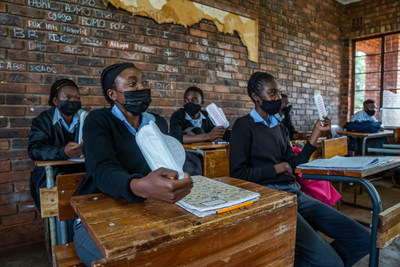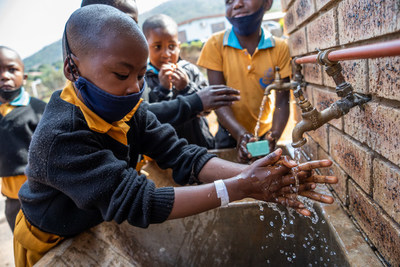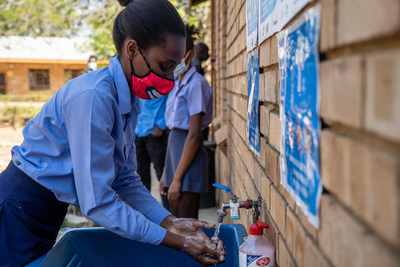Kimberly-Clark and its 'Toilets Change Lives' Program Brings Clean Water and Sanitation Solutions to 7 Million People Across 15 Countries
On November 16, 2021, Kimberly-Clark announced its ongoing commitment to improving global sanitation through its "Toilets Change Lives" program. This initiative has positively impacted over 7 million individuals in 15 countries by providing access to clean water and sanitation solutions. The company aims to enhance the lives of 1 billion people by 2030, focusing on underprivileged communities. Collaborating with organizations like Plan International and WaterAid, Kimberly-Clark addresses critical sanitation needs, particularly in Latin America and Asia.
- Over 7 million people positively impacted by the Toilets Change Lives program.
- Aims to improve the lives of 1 billion people in underserved communities by 2030.
- Partnerships with Plan International and WaterAid enhance community sanitation efforts.
- Over 2 billion people globally still lack access to basic sanitation.
- 50% of health clinics in low- and middle-income countries lack piped water.
DALLAS, Nov. 16, 2021 /PRNewswire/ -- Access to clean water, hygiene and sanitation services remains essential to protecting human health, especially during the COVID-19 pandemic. Globally, more than 2 billion people lack access to basic sanitation, including toilets. The United Nations General Assembly officially designated Nov. 19 as World Toilet Day in 2013 to raise awareness and inspire efforts to bring solutions to these communities.
A study of 130,000 health clinics in low- and middle-income countries showed that 50 percent of the clinics didn't have piped water. Additionally, 785 million people do not have clean water close to home. Without access to safe toilets and clean water, women often wait for the cover of darkness to have privacy and safety, children can succumb to life-threatening, waterborne diseases, and millions of girls miss school because menstruation becomes too hard to manage.
Kimberly-Clark and the Kimberly-Clark Foundation have formed partnerships and programs to help address this global health crisis. In 2014, Kimberly-Clark launched Toilets Change Lives, a multinational program that supports solutions to the global sanitation crisis. Through consumer awareness, NGO partnerships and on-the-ground activations, the company brings toilets, sanitation education and increased health, safety and dignity to many of the world's most vulnerable communities. Since the program's launch seven years ago, the Toilets Change Lives program has impacted the lives of more than 7 million people across 15 countries.
"The challenges faced over the last few years have put health and safety at the global forefront while illuminating social and environmental gaps that still need to be bridged," said Jenny Lewis, Vice President of the Kimberly-Clark Foundation. "We're committed to doing our part to address long-standing social inequities by creating effective programs and forging strategic partnerships that create lasting change in communities across the world."
As part of its global ambition and purpose to provide Better Care for a Better World, Kimberly-Clark is working to improve the lives and well-being of 1 billion people in vulnerable or underserved communities around the world by 2030 with the smallest environmental footprint. Several programs run by the company and its foundation are combining with other efforts and strategic partnerships to create positive social outcomes in areas that support three of the UN's Sustainable Development Goals (SDG):
- Caring for the health and well-being of people at all stages of life (SDG 3);
- Challenging stigmas and championing the progress of women everywhere (SDG 5); and
- Championing a world where all enjoy access to clean water and sanitation (SDG 6).
Additionally, Kimberly-Clark recognizes that the smallest environmental footprint is just as essential to helping people live a better life, and the company is focused on the areas where it can make the biggest difference – climate, forests, water and plastics.
MORE THAN JUST A TOILET: ACCESS TO SANITATION IMPACTS COMMUNITIES FOR GENERATIONS TO COME
Kimberly-Clark, Plan International and Water For People Team Up to Help Latin America Communities
This year, the Toilets Change Lives program has provided resources in nine countries in Latin America – Bolivia, Peru, Brazil, Guatemala, Honduras, Nicaragua, Ecuador, Colombia and El Salvador. This was done in partnership with Kimberly-Clark's customers as well as NGOs such as Water For People and Plan International.
These efforts are part of Water For People's Healthy Nicaragua Campaign, which reached 450,000 people with messages about how to prevent the spread of COVID-19. In Peru, the effort was connected to a government-led water, sanitation and hygiene (WASH) roundtable to support the implementation of a national plan to prevent the spread of communicable diseases such as COVID-19.
"With billions of people around the world still lacking access to water, sanitation and hygiene services, Water For People and Kimberly-Clark are working together and combining resources that deliver measurable impact," said Eleanor Allen, CEO of Water For People. "The Toilet Changes Lives program provides the world's most vulnerable communities with access to reliable and safe sanitation services."
Plan International Supports Latin America Communities
Kimberly-Clark continues to look for opportunities to support the communities and regions where it operates. Recently, in response to COVID-19 economic hardships and local shutdowns that limited access to essential items, the Kimberly-Clark Foundation partnered with Plan International, a development and humanitarian organization that works in more than 75 countries across the world, to help children and their families in Brazil, Colombia and Ecuador gain access to sustainable sanitation and hygiene facilities along with education.
In Brazil, Plan International and Kimberly-Clark built and repaired nine bathrooms, including 17 toilets, providing 1,686 youth with access to new facilities. Additionally, the two organizations delivered more than 81,000 menstrual health kits to 49,553 women living in Brazil, giving them access to essential products like sanitary pads, toilet paper, toothpaste, and soap. In Ecuador, the foundation and Plan International delivered hygiene kits to 465 families, which included flyers to educate parents and kids on handwashing best practices.
Additionally, in Colombia, Plan International built and renovated 17 toilets in three schools, and 462 families received hygiene kits (soap, cleaning materials, toilet paper, toothpaste, etc.). For the rest of 2021, Plan International will continue virtual training activities with children, their families and their teachers in the schools where the project is implemented.
"Access to safe and clean toilets is essential for girls to unlock their full potential, especially during COVID-19," said Shanna Marzilli, Interim President and CEO of Plan International USA. "Collaborating with Kimberly-Clark and its Scott® and Neve® brands has allowed girls and their families to lead healthier lives, and we are thrilled to have expanded our partnership to El Salvador this year."
WaterAid Provides Sanitation Access in African and Asian Communities
Kimberly-Clark and WaterAid are working together to improve hygiene behaviors among communities in Lagos, Nigeria. With a goal of benefitting 45,000 people, WaterAid Nigeria is partnering with institutions and local governments to increase the awareness of safe hygiene behaviors among pregnant and breastfeeding women, promoting hygienic practices, setting up handwashing facilities, distributing hygiene kits in public facilities (such as schools, community centers and primary healthcare centers) and partnering with Lagos authorities to accelerate change by including hygiene behavior change recommendations in their large-scale hygiene promotional campaigns. As part of this project, WaterAid plans to construct 25 toilets across five secondary schools.
In Uganda, WaterAid is implementing a water, sanitation and hygiene project in the developing city of Mbale to ensure that 111,300 residents across six urban settlements have access to safe and reliable water, toilets and hygiene facilities.
Transforming Public Sanitation Services in Bangladesh
Kimberly-Clark and its Andrex® brand have partnered since 2017 with WaterAid on an initiative to transform public sanitation services through the construction and management of inclusive public toilets across three cities in Bangladesh. In 2021, Kimberly-Clark renewed its commitment to supporting WaterAid's programs by investing in work that will increase access to public toilets in three new cities, providing 8.7 million uses of decent toilets and access to clean water.
The nine public toilet blocks in this program have generated over 1.6 million uses since 2017, well above the projected 700,000 uses.
Additionally, WaterAid coordinated training for 26 local women across three cities in Bangladesh to oversee the operation and maintenance of public toilets and ensure high standards of cleanliness. These female employees increase the confidence of other women and encourage them to use the toilets, challenging the perception that public toilets are unpleasant, unsafe and unhygienic.
Watch the story of Sanjida and her family in Bangladesh, and learn more about the impact that toilets provide for communities around the globe.
KIMBERLY-CLARK AND TOILET BOARD COALITION COMPLETE FEMALE-FOCUSED INNOVATION LAB PILOT
To help address some of the world's biggest sanitation issues, Kimberly-Clark, its foundation and the company's Kotex® brand partnered with the Toilet Board Coalition, which the company helped found in 2015, to create the Women in the Sanitation Economy Innovation Lab. The lab aims to develop and catalyze women-led, early-stage businesses within the sanitation economy. The Innovation Lab recently completed its first pilot, which included five startup businesses from Kenya, the U.S. and the U.K., along with 11 Kimberly-Clark employees who served as mentors to the group.
The participating businesses received mentorship and training to help them address some of their biggest business challenges and positively contribute to some of the world's most pressing sanitation issues. Participants reported that the Innovation Lab improved their business operations and internal processes.
"We are proud to have Kimberly-Clark's Kotex® brand providing strategic support and mentorship to the Women in the Sanitation Economy Innovation Lab initiative," said Greg Davies, CEO at the Toilet Board Coalition. "The program is designed to incubate innovations and business models from around the word to meet consumer demand, close the gaps on hygiene – including women's health – and promote the empowerment of women by supporting business solutions led by women."
About Kimberly-Clark
Kimberly-Clark (NYSE: KMB) and its trusted brands are an indispensable part of life for people in more than 175 countries. Fueled by ingenuity, creativity, and an understanding of people's most essential needs, we create products that help individuals experience more of what's important to them. Our portfolio of brands, including Huggies, Kleenex, Scott, Kotex, Cottonelle, Poise, Depend, Andrex, Pull-Ups, GoodNites, Intimus, Neve, Plenitud, Sweety, Softex, Viva and WypAll, hold No. 1 or No. 2 share positions in approximately 80 countries. We use sustainable practices that support a healthy planet, build strong communities, and ensure our business thrives for decades to come. To keep up with the latest news and to learn more about the company's nearly 150-year history of innovation, visit kimberly-clark.com.
[KMB-S]
![]() View original content to download multimedia:https://www.prnewswire.com/news-releases/kimberly-clark-and-its-toilets-change-lives-program-brings-clean-water-and-sanitation-solutions-to-7-million-people-across-15-countries-301424723.html
View original content to download multimedia:https://www.prnewswire.com/news-releases/kimberly-clark-and-its-toilets-change-lives-program-brings-clean-water-and-sanitation-solutions-to-7-million-people-across-15-countries-301424723.html
SOURCE Kimberly-Clark Corporation
FAQ
What is the Toilets Change Lives program by KMB?
When was World Toilet Day established?
What is Kimberly-Clark's goal for 2030?
How is KMB addressing sanitation issues in Latin America?











